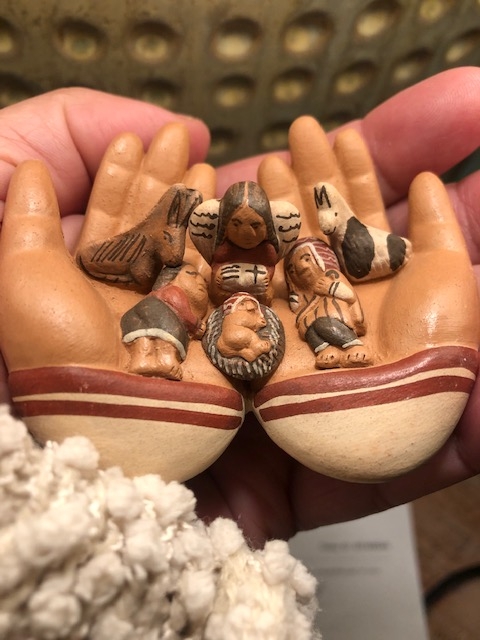
Good morning…
I hold in one hand our newest nativity, brought home for a dollar from last weekend’s yard sale. The intimacy surprises me. Animals and humans, angel and baby, each handcrafted clay figure rests securely on the open palms of the Almighty Creator. What is the one thing this small nativity has in common with all other nativities? The ones pulled from a box in the basement or attic. The ones blown up or plastic, gracing lawns in December. The ornate ones blessing our churches each Advent season. Here is the one common feature: All eyes are locked on the baby Jesus. Every eye in every nativity across our globe shares the same focus, staring, gazing, soaking in this Eternal God wrapped in soft skin. We envision ten tickly toes. We imagine ten fragile fingers. Like with any new arrival born onto earth, we marvel at the tiny nose, lips, and ears.
“The Word became flesh and made his dwelling among us,” explains John 1:14 (NIV). “We have seen his glory, the glory of the one and only Son, who came from the Father, full of grace and truth.” This verse is repeated each year, so we can glaze over and miss the incredible impact. Let’s look at this single verse in another translation.
“And so the Living Expression became a man (or “became visible”) and lived among us!” says The Passion Translation.
The footnote here reads: “This is the fulfillment of Isaiah 7:14. The Lord himself will give you a sign. Behold—the virgin will conceive and give birth to a son and will name him God Among Us. The ‘God with us’ is Jesus Christ our Immanuel. He is among us in that he is in human form, a man for all eternity. The Greek and Aramaic reads, ‘he pitched his tent among us.’ This takes us back into the book of Exodus where God came down and lived in the tent (tabernacle) in the wilderness. “Have them make a Sanctuary for Me, so that I may dwell among them” (Exodus 25:8, TLV).”
“And we gazed upon the splendor of his glory (the Aramaic is, “We gazed upon his preciousness”), the glory of the One and Only (the Aramaic is, ‘Unique and Beloved Son.’ The Greek word, monogenes, means ‘of a single [mono] kind [genes]’) who came from the Father overflowing with tender mercy and truth!”
The footnote here reads: “The Aramaic word, taybootha, means ‘loving kindness or goodness.’ The Greek word is charis, which can also be translated, ‘grace, favor, sweetness, pleasure or delight.’ The translator has combined all those concepts in the words tender mercy. Truly, Jesus Christ is full of everything that our hearts crave.”
Captivated by our new, intimate nativity, sparkly phrases linger from this less familiar translation. Living Expression living among us, “God with us,” Immanuel. He pitched his tent, making a living Sanctuary, dwelling among us. Now we gaze upon his preciousness, this Unique and Beloved Son, who came from the Father overflowing with tender mercy and and saving truth.
As the Creator of the universe camps out among us in vulnerable flesh, Jesus is full of everything our hearts crave. We crave good loving kindness. We crave the gift of grace and unconditional favor. We crave sweetness, pleasure, and delight with a Daddy. In every nativity in every nation, no wonder every eye stares at one baby boy swaddled in magnificent Mystery.
…Sue…





